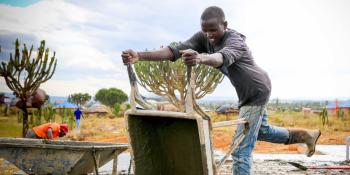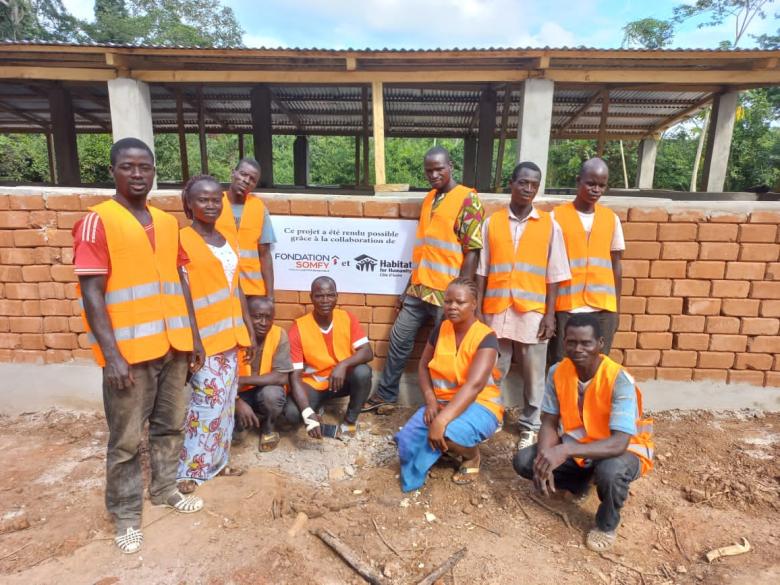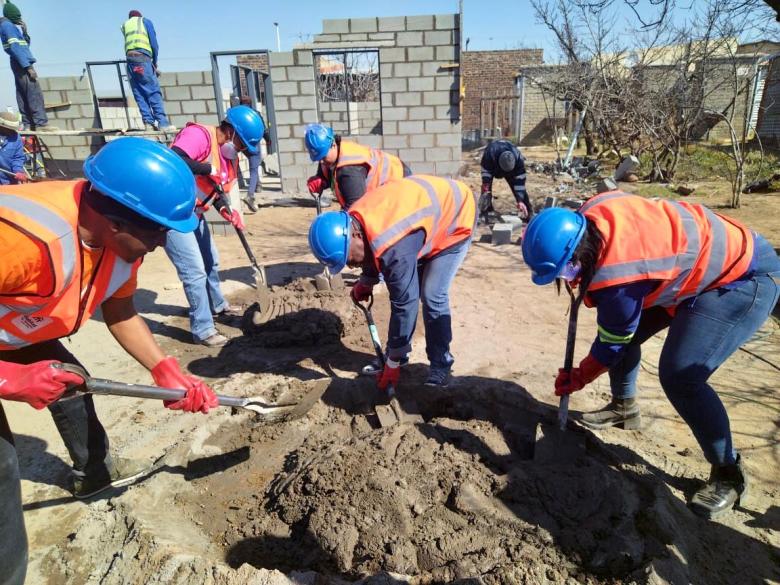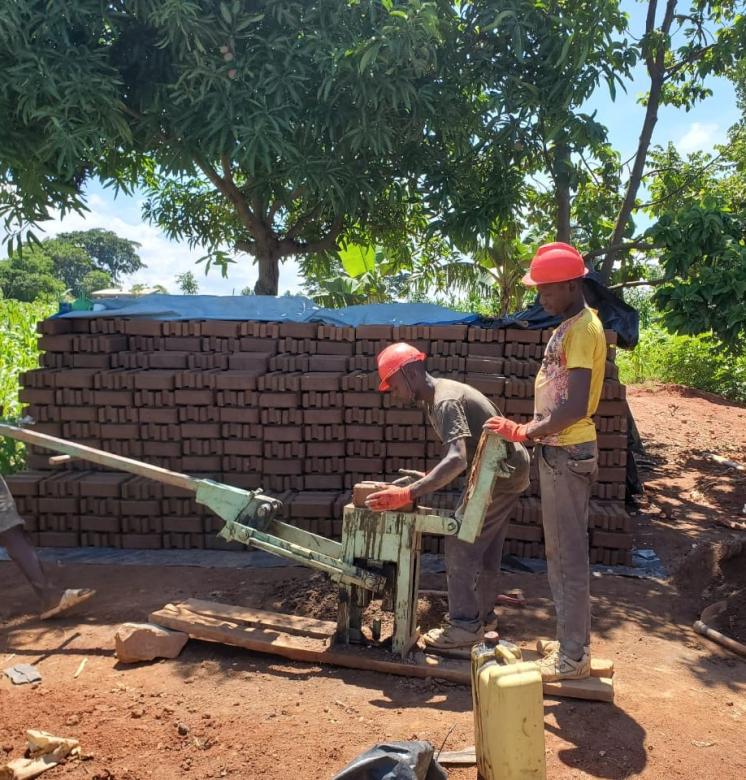
Urban October 2024: Can Youth Innovation Solve the Most Pressing Challenges Facing Our Cities?
As we mark Urban October 2024, we find ourselves at a pivotal moment to reflect on the state of our cities and towns. This year, the World Habitat Day on October 7th, themed “Engaging Youth to Create a Better Urban Future,” and World Cities Day on October 31st, which focuses on “Youth Leading Climate and Local Action for Cities.” provides a unique opportunity to address pressing urban challenges while celebrating the innovative solutions led by young people.
More than half of the global population - around 4.4 billion people- reside in cities. This urbanization trend is projected to persist, with the urban population expected to more than double by 2050, when nearly 7 out of 10 people will live in urban areas. Therefore, the challenges of housing, climate change, and infrastructure demand innovative solutions led by today’s youth.

Youth cooperative supported by Habitat for Humanity Cote d’Ivoire
The Promise of Youth in Urban Development
With 60% of Africa’s population under 25, the continent’s youth are not only the future but the present architects of urban solutions. As our cities grow, they face immense challenges—ranging from inadequate housing and limited job opportunities to the mounting impacts of climate change and insecure land tenure. Yet, amid these challenges lies a wellspring of potential. Youth are not simply the leaders of tomorrow; they are agents of change today.
In my work with Habitat for Humanity, I’ve had the privilege of witnessing youth contributions to urban landscapes firsthand. In Malawi, for example, our programs empower young people through skills training in eco-friendly building techniques. Partnering with local governments, we involve youth in constructing climate-resilient homes, training them to make alternative energy sources like briquettes, and engaging them in tree-planting initiatives under the Home Equals Campaign .
Through training and advocacy platforms, we actively involve young people in volunteer programs that make a tangible difference in their communities.

Volunteers during the annual Nelson Mandela Build held in June 2024, South Africa
In Ha-Ramabanta, Lesotho, our Youth Build program provides young volunteers with hands-on experience in constructing homes using sustainable techniques. This builds their confidence and empowers them to advocate for sustainable urban policies in their communities. In Kenya, our collaboration with local authorities has integrated housing initiatives into the national policy framework, advancing the Kenyan government’s commitment to affordable housing under its National Housing Policy.
In Uganda, Habitat for Humanity’s projects have engaged vulnerable communities, including youth, in providing sustainable water and sanitation solutions. By partnering with Uganda’s National Water and Sewerage Corporation, we’ve extended low-cost, clean water access to informal settlements in Kampala.
Additionally, our Terwilliger Centre for Innovation in Shelter in Kenya focuses on developing the local housing ecosystem, particularly through youth participation. By promoting alternative building technologies, such as interlocking stabilized soil blocks (ISSBs), we’re reducing construction costs and carbon emissions while equipping young artisans with skills that foster both innovation and sustainability in urban housing development.
ISSB trainee in Laikipia, Kenya
Habitat for Humanity recognizes that youth are pivotal in addressing housing challenges and driving sustainable urban growth. By working closely with local governments, communities, and young leaders, we are shaping cities where young people are not just beneficiaries but active architects of change.
These projects not only provide essential shelter but also equip youth with valuable vocational skills, aligning with the African Union’s Agenda 2063 and the New Urban Agenda , both of which emphasize sustainable development and inclusive urbanization.
Advocacy and Innovation: Empowering Youth Through Housing Solutions
Through our advocacy efforts, we have cultivated partnerships with governments, civil society organizations, and international bodies to implement housing related policies while engaging youths, young women and low-income earners.
The African Union’s Youth Engagement Strategy, for instance, mirrors our belief that including young people in urban development is essential for resilient cities. This initiative promotes youth involvement in policymaking, particularly in areas related to urban planning, governance, and climate action. Earlier this year, at the AU ECOSOCC meeting, I had the honor of leading a session focused on building resilient communities. Youth participation was a central theme, with discussions on peace, security, climate change, and land governance. During this session, I emphasized, “True resilience is achieved when we empower communities to participate actively in decision-making processes. The voices of women, youth, and marginalized groups must be heard at every stage.”
The voices of women, youth, and marginalized groups must be heard at every stage of decision-making.

Youth engaging in ISSB production in Uganda
Youth Advocacy Through Creativity
Advocacy today goes beyond traditional platforms. Across Africa, young people use music, art, and social media to champion causes like land rights, climate resilience, and urban governance. For instance, during COP28 in Dubai, youth leaders used songs to amplify messages on climate action and land governance among other issues across the 17 SDGs.
During a visit to Habitat for Humanity Zambia, I interacted with youth who use the Participatory Approach for Safe Shelter Awareness (PASSA) to engage local government officials on land tenure security. One young woman remarked, “The skills and advocacy training provided by Habitat Zambia have equipped me to lead conversations on secure housing in my community. I have successfully encouraged more than 20 youth to participate in PASSA activities. They now know how to engage with local government officials on land tenure security.”
A Collective Call to Action
While the potential for youth-led urban development is vast, significant challenges remain. Limited access to education and employment opportunities often excludes young people from decision-making processes. However, despite these barriers, they continue to find creative ways to engage, using their talents to influence urban governance and climate policies.
The future of Africa’s cities rests in the hands of its youth. Together, we must ensure they have the resources, platforms, and opportunities to succeed. As Nelson Mandela wisely said, “There is no passion to be found in settling for a life that is less than the one you are capable of living.” Today’s youth have the passion, energy, and ability to create resilient, inclusive, and sustainable cities.
This Urban October, let us commit to empowering youth to lead the way toward a brighter urban future.